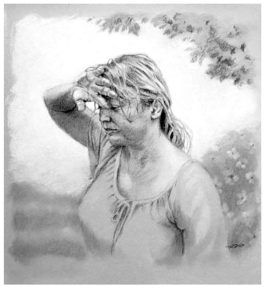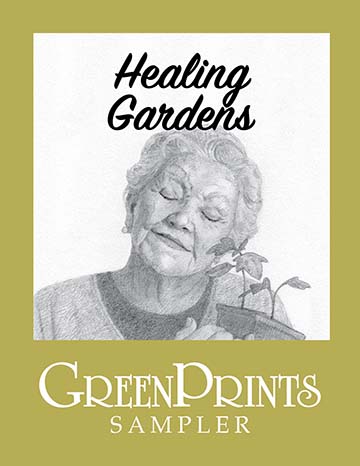Today’s My Mother’s Garden story is rich with so many emotional ups and downs that it’s hard to decide if it has a happy ending or not.
But what I love about this piece by Kika Dorsey, is that it’s about one of my favorite topics: healing gardens. Sometimes, bringing things to life and working to keep them alive is the only way to cope with the goings-on of life. In this story, Kika talks about how her mother used gardening to cope with her husband’s suicide attempts.
What I find fascinating though, is that even written as an adult, Kika says that while she was in a camp for the Summer, and her father was in the hospital, her mother just stayed home tending to the garden. You must imagine that her mother had many other important things to do, but in the eyes of a child, her mom was just home plucking weeds and pruning vegetable plants. How comforting.
It’s a testament to the power of healing gardens. That amongst the chaos, this child sees her mother as a nurturer who can transform a hard day into a good night—a bitter stalk of rhubarb into a sweet pie.
Download our FREEBIE, GreenPrints Sampler: Healing Gardens today and read about the power of a healing garden to offer hope and soothe a broken heart.
In the Process of Healing, Gardens Do Some of the Work
This story comes from our archive that spans over 30 years and includes more than 130 magazine issues of GreenPrints. Pieces like these that inject healing gardens into everyday life lessons always brighten up my day, and I hope it does for you as well. Enjoy!

My Mother’s Garden
It kept her—and all of us—going.
By Kika Dorsey
The third time my father tried to commit suicide was the summer my mother worked hardest on our garden. He was in a mental hospital, and it was a typical Midwest Summer—hot, humid, and punctuated with thunderstorms. I was eleven years old and spending my days at the City Club, which consisted of a pool and a dingy locker room with concrete floors and showers that felt like needles, while my mother stayed home and weeded the beds of flowers and the vegetable garden.
My mother was Austrian and grew up after the war scavenging in the Alps for mushrooms, nettle, and elderberry blossoms they fried in butter if they could find someone who’d trade butter for potatoes. Now in South Bend, Indiana, she collected seeds of herbs from her visits to her stepmother in Leoben and planted them in our backyard, where they grew green and lush in the soil she made rich with cow manure she got from a farmer from Michigan (its stench used to embarrass me). With the herbs she made Kartofelknoedel, bread dumplings made of stale bread, broth, and herbs. She also planted currant bushes, and I used to pick the tiny sour berries and eat them. In August she would harvest them and turn them into jam.
All year round we ate it in Palatschinken, crepes filled with jam and sprinkled with powdered sugar, or in our peanut butter sandwiches. My mother hated peanut butter but reluctantly fed it to us. She said it was like eating food that someone had chewed for you.
That Summer, she labored for hours weeding the flowerbeds that encircled our back lawn. She was especially proud of her roses, but the daisies, poppies, and myriad other flowers gave the frame of that yard a kaleidoscope of color. She would come into the house periodically to get another beer, her face covered in sweat, her brown strands of hair wet against her tan face, her arms muscular from all the planting and digging and weeding. She was building a world, while I spent my days swimming back and forth in chlorinated pools, coming home to eat what my mother supplied—carrots, tomatoes, strawberries.
Sometimes I had to visit my father, who shuffled on the dirty linoleum of the mental hospital, his lips dry and white from drugs. He gave us presents he’d crafted there. Once he gave me a hickory box he’d shellacked with a picture of a farm—a red barn, horses grazing, a field of grain ripe for the harvest. The day he gave me that gift, we came home and my mother asked me to gather rhubarb and strawberries. She said she would make a pie for us.

I went into the backyard and into the garden and swiped away the flies and mosquitoes from my face as I picked the strawberries from the rich soil. Then I went to the back, to the alley where the rhubarb nested in the weeds, with red stripes and its skin so tough and meat so sour.
I knew only my mother could turn it into something sweet. ❖
By Kika Dorsey, published originally in 2019, in GreenPrints Issue #118. Illustrations by Christopher Reid.

Did you enjoy this story about healing gardens? Leave a comment below with your own story!
Download our FREEBIE, GreenPrints Sampler: Healing Gardens today and read about the power of a healing garden to offer hope and soothe a broken heart.



